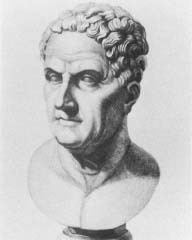Galen
Galen (circa A.D. 130-200), the last and most influential of the great ancient medical practitioners, was born in Pergamum in Asia Minor. His father, the architect Nicon, is supposed to have prepared Galen for a career in medicine following instructions given to him in a dream by the god of medicine, Asclepius. Accordingly, Galen studied philosophy, mathematics, and logic in his youth, then began his medical training at age 16 at the medical school of Pergamum attached to the local shrine of Asclepius.

At age 20, Galen embarked on extensive travels, broadening his medical knowledge with studies at Smyrna, Corinth, and Alexandria. At Alexandria, the most celebrated research and teaching center of the time, Galen was able to study skeletons, but not actual bodies. This was because religious restrictions forbade the dissection (cutting up) of human remains.
Returning to Pergamum at age 28, Galen became physician to the gladiators, which gave him great opportunities to observe human anatomy and physiology. In A.D. 161, Galen moved to Rome and established a successful practice. He also conducted public lectures and demonstrations, began writing some of his major works on anatomy and physiology, and frequently engaged in vigorous debates with fellow physicians. In A.D. 174, Galen was summoned to treat Roman ruler Marcus Aurelius; as a result, he later became the emperor's personal physician.
Galen returned to Pergamum in A.D. 166, perhaps to escape a quarrel with his colleagues or to avoid an outbreak of plague in Rome. After a few years, he was summoned back to Rome by Marcus Aurelius. Galen became physician to two later emperors and seems to have stayed in Rome for the rest of his career, probably dying there in about A.D. 199.
Galen was an astonishingly prolific writer, producing hundreds of works, of which about 120 have survived. His most important contributions were in anatomy. Galen expertly dissected and accurately observed all kinds of animals, sometimes mistakingly applying what he saw to the human body. His descriptions of bones and muscle were notable. He was the first to observe that muscles work in contracting pairs, and described the heart valves and the structural differences between arteries and veins. He used experiments to demonstrate paralysis resulting from spinal cord injuries, and the passage of urine from kidneys to bladder. Galen pioneered diagnostic use of the pulse rate. In his extensive travels Galen also collected plants with healing properties and explained their uses.
Galen's Errors
Unfortunately for medieval medicine, Galen made critical errors about the heart and blood vessels that remained virtually unchallenged for 1,400 years. He correctly recognized that blood passes from the right to the left side of the heart, for example, but decided this was accomplished through tiny pores (holes) in the septum (wall separating the two chambers of the heart), rather than through the pumping action of the heart. Galen also believed that blood formed in the liver and was circulated from there throughout the body in the veins. He showed that arteries contain blood, but thought they also contained and distributed pneuma, a vital spirit. In a related idea, Galen believed that the brain generated and transmitted another vital spirit through the (hollow) nerves to the muscles, allowing movement and sensation.
After Galen, experimental physiology and anatomical research stopped for many centuries. Galen's teachings became the ultimate medical authority, approved by the Christian church because of Galen's belief in a divine purpose for all things. The medical world moved on from Galenism only with the appearance of Andreas Vesalius' (1514-1564) work on anatomy in 1543 and William Harvey 's (1578-1657) studies of blood circulation in 1628.
galen is a profitable fellow to his generation and ours ,
thanks
:)
thanks x